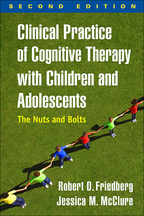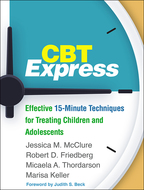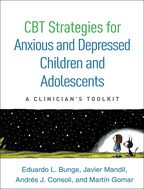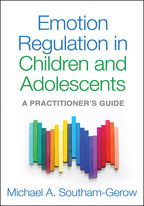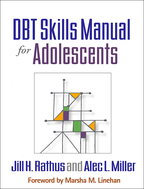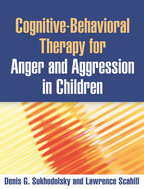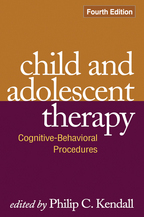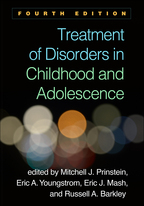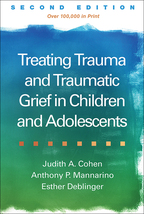Cognitive Therapy Techniques for Children and Adolescents
Tools for Enhancing Practice
Robert D. Friedberg, Jessica M. McClure, and Jolene Hillwig Garcia
HardcoverPaperbacke-bookprint + e-book
Hardcover
orderJuly 15, 2009
ISBN 9781606233139
Price: $65.00 326 Pages
Size: 7" x 10"
Paperback
orderOctober 17, 2014
ISBN 9781462520077
Price: $43.00326 Pages
Size: 7" x 10"
Read a Q&A with featured author, Robert D. Friedberg!
The reproducible materials can be downloaded and printed in PDF format.
The reproducible materials can be downloaded and printed in PDF format.
“A practical, well-written 'toolbox' of cognitive behavioural therapy (CBT) techniques for children and youth, written for CBT therapists. The authors provide a wide range of CBT tools....What is refreshingly unique about this volume is that the authors have created a modular approach to CBT that can be individualized for each patient. I highly recommend this book for child and adolescent psychiatrists and other mental health professionals practicing CBT with children and youth, especially patients suffering from anxiety who are keen to be treated in a family or group context.”

—Journal of the Canadian Academy of Child and Adolescent Psychiatry
“Helpful...accessibly written.”

—Young Minds Magazine
“All child therapists should have this book on their shelves. It is written in a candid, user-friendly manner, and is filled with useful resources, such as rating scales that help to capture and quantify the diversity of symptoms in youth, useful downloadable forms, and sample therapist-client dialogues. The information on psychoeducational resources for children and their parents is comprehensive and well organized. The book has a nice balance between the theory of cognitive and behavioral interventions and the practical techniques needed to actually conduct the therapy.”

—Craig L. Donnelly, MD, Chief, Section of Child and Adolescent Psychiatry; Director, Pediatric Psychopharmacology, Dartmouth-Hitchcock Medical Center
“Clearly articulated techniques are illustrated with activities and vignettes that make them come alive. This is one of the few books that address the process of cognitive-behavioral therapy with children, including how to implement the techniques in the context of the child-therapist relationship. I highly recommend this book for graduate courses in child psychotherapy and for practicing professionals seeking creative therapeutic activities and helpful assessment measures to implement with children.”

—Elizabeth A. Gosch, PhD, ABPP, Director, MS Program in Counseling and Clinical Health Psychology, Philadelphia College of Osteopathic Medicine
“Over the years, Friedberg and his colleagues have filled a gaping hole in the cognitive-behavioral therapy literature by writing innovative and useful guides for child and adolescent therapists. This book is packed with creative, witty, and practical methods, including some that use technologies, like text messaging, that younger clients are likely to favor. The authors helpfully organize the techniques by their purpose and highlight the client ages and clinical problems best served by each. This is one of those rare books that therapists can open at any page to find creative ideas that are immediately useful. If you work with children, adolescents, or families, keep this book on your desk; I predict it will become your most well-thumbed reference.”

—Christine A. Padesky, PhD, Cofounder, Center for Cognitive Therapy, Huntington Beach, California
“Unlike a 'one-size-fits-all' manual, this book uses a modular approach that illustrates creative, flexible, and empirically supported techniques. This book will change the way you think about cognitive therapy with children, adding a sense of interest, excitement, and playfulness that is too often absent from the literature. There are very few 'how-to' guides in this area and fewer still that are rooted in research evidence and a genuine understanding of cognitive-behavioral theory. Both new and seasoned clinicians will find clear presentations of technique and refreshingly new and appealing approaches to meeting kids' therapy needs.”

—Ellen Flannery-Schroeder, PhD, ABPP, Director, Clinical Psychology Program, Department of Psychology, University of Rhode Island
—Journal of the Canadian Academy of Child and Adolescent Psychiatry
“Helpful...accessibly written.”
—Young Minds Magazine
“All child therapists should have this book on their shelves. It is written in a candid, user-friendly manner, and is filled with useful resources, such as rating scales that help to capture and quantify the diversity of symptoms in youth, useful downloadable forms, and sample therapist-client dialogues. The information on psychoeducational resources for children and their parents is comprehensive and well organized. The book has a nice balance between the theory of cognitive and behavioral interventions and the practical techniques needed to actually conduct the therapy.”
—Craig L. Donnelly, MD, Chief, Section of Child and Adolescent Psychiatry; Director, Pediatric Psychopharmacology, Dartmouth-Hitchcock Medical Center
“Clearly articulated techniques are illustrated with activities and vignettes that make them come alive. This is one of the few books that address the process of cognitive-behavioral therapy with children, including how to implement the techniques in the context of the child-therapist relationship. I highly recommend this book for graduate courses in child psychotherapy and for practicing professionals seeking creative therapeutic activities and helpful assessment measures to implement with children.”
—Elizabeth A. Gosch, PhD, ABPP, Director, MS Program in Counseling and Clinical Health Psychology, Philadelphia College of Osteopathic Medicine
“Over the years, Friedberg and his colleagues have filled a gaping hole in the cognitive-behavioral therapy literature by writing innovative and useful guides for child and adolescent therapists. This book is packed with creative, witty, and practical methods, including some that use technologies, like text messaging, that younger clients are likely to favor. The authors helpfully organize the techniques by their purpose and highlight the client ages and clinical problems best served by each. This is one of those rare books that therapists can open at any page to find creative ideas that are immediately useful. If you work with children, adolescents, or families, keep this book on your desk; I predict it will become your most well-thumbed reference.”
—Christine A. Padesky, PhD, Cofounder, Center for Cognitive Therapy, Huntington Beach, California
“Unlike a 'one-size-fits-all' manual, this book uses a modular approach that illustrates creative, flexible, and empirically supported techniques. This book will change the way you think about cognitive therapy with children, adding a sense of interest, excitement, and playfulness that is too often absent from the literature. There are very few 'how-to' guides in this area and fewer still that are rooted in research evidence and a genuine understanding of cognitive-behavioral theory. Both new and seasoned clinicians will find clear presentations of technique and refreshingly new and appealing approaches to meeting kids' therapy needs.”
—Ellen Flannery-Schroeder, PhD, ABPP, Director, Clinical Psychology Program, Department of Psychology, University of Rhode Island


